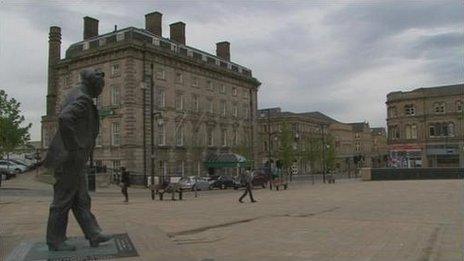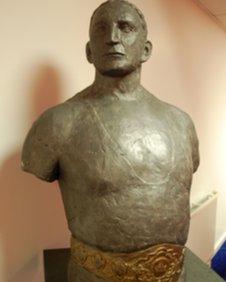Huddersfield remembers birth of rugby league
- Published

A new game was born out of northern rebellion in the George Hotel, Huddersfield
Rugby league is a game that stirs real passion in its fans. In England it is played mainly, but not exclusively, in the north and its supporters seem to have a strong feeling of solidarity to the sport.
Now a project in Huddersfield has been given a £100,000 grant to celebrate, record and archive the heritage of the game in its birthplace.
As writer and traveller Geoffrey Moorhouse said about the experience of being a rugby league follower: "It is an expression of who I am and where I come from, the history of our people and our ancestral lands".
He was writing after a visit to Huddersfield's George Hotel where the game was born in 1895, when northern clubs split from the Rugby Football Union to form their own game.
The town already hosts a rugby league heritage centre at the hotel.
Game's great players

Stories such as that of Douglas Clark will will be used to bring history alive
Sport historian Brian Heywood's new project will, with the help of many volunteers, gather together the artefacts and oral history of players and supporters of the game into an archive.
Stories of the game's great Huddersfield players will be used to enthuse school children who will be trained to record oral histories about the game at all levels in the town.
Mr Heywood said: "A project like this can help children who might not be particularly enthusiastic about school work."
One "extraordinary resource" of the project in schools will be Douglas Clark's war diaries. Clark was a member of Huddersfield's cup-winning team before World War I intervened.
A written diary kept by him in 1917 on the Western Front with the army has been identified in the Imperial War Museum.
Injured by shrapnel
The diary is being transcribed by research students at Huddersfield University for the project.
Clark was injured by shrapnel and invalided out of the army and told he would never play the game again. But by 1920 he was again a member of the Great Britain touring team to Australia.
In all he played 485 times for Huddersfield and is a member of the Rugby League Hall of Fame. He also became a champion wrestler.
The end of the heritage project, in 2014, will resonate with the club's history.
It will be 100 years since the Huddersfield Team of all Talents, or as Mr Heywood calls it "probably the greatest rugby league team of all time", won all four cups in the 1914-15 season.
The centenary of the start of WWI - and the end of much more than just that great team - will also be marked.
Mr Heywood said: "It is possible we might speak to an old man or woman whose granddad was in that first founding meeting at the George in 1895".
The project backed by the Heritage Lottery Fund will hold exhibitions, design a website and use sport in local schools to help teach the national curriculum, including a history of WWI in the town.
Working in mills
Mr Heywood said: "Sport will allow us to teach Victorian history through rugby league. Clubs like Huddersfield came into being because of the growth in population of the woollen and worsted industries.

The artefacts and oral history of rugby league in Huddersfield will be collected
"The game prospered too because of the increase in the speed of travel and communications, and the 1850 factory act freed up Saturday afternoon to the mill workers for sport."
Ex-New Zealand rugby league international Robbie Hunter-Paul, who works with Huddersfield Giants rugby league team, said: "This will bring a rich legacy in its path. It will give children the essence of where they came from, what their society is built on.
"It will show the hardship of working in the mines and mills and why that discipline made the men that made rugby league."
Professor Tony Collins, director of the International Centre for Sports History at De Montfort University, said: "The nature of rugby league is that it is deeply rooted in communities and despite 170 years of changes at its core it still retains that sense of history and community."
Mr Heywood said: "The rugby league community is definitely 'All for one and one for all'. It loves the game."
- Published25 January 2012